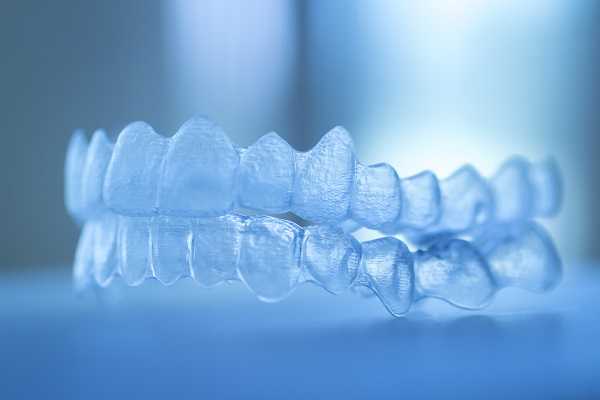Truths and Myths About Invisalign® Aligners

If you are considering getting Invisalign® aligners to straighten out your teeth, you have probably heard both positive and negative things about them. However, Invisalign can be an effective treatment for a variety of orthodontic conditions. It can also be shorter than other treatments. Read on to learn what is true and what is not.
Myth: Invisalign® aligners are more uncomfortable
This is a myth because Invisalign can be just as comfortable, if not more comfortable, as braces. While no orthodontic treatment is fun, Invisalign aligners can be easier than other orthodontic devices. For example, patients can take out the aligners while eating, allowing the patient to eat sticky and hard foods that would normally be off-limits with braces.
Because the Invisalign process uses few or no brackets, patients also will not have to worry about sores developing on the cheeks or lips. The lack of wires makes it easier for patients to keep their teeth clean.
Myth: Invisalign® is not effective for severe problems
Many people mistakenly believe that Invisalign is only for those who have minor orthodontic problems. However, this is not true. Because the Invisalign set is customized to each patient’s needs, the set can treat a variety of orthodontic problems, including:
- Crossbites
- Overbites
- Gaps
- Crowding
- Underbites
- Open bites
Invisalign can help patients with these problems or other ones.
Truth: Invisalign® takes less time than other treatments
Generally, the Invisalign aligners are more effective than traditional braces. The average time needed for Invisalign aligners to work is about 12 to 18 months. In contrast, traditional metal braces generally take about two years.
This is assuming that a patient will wear each aligner for 22 hours a day. If patients do not wear aligners at least 22 hours a day, the treatment may take longer. However, this is true for metal braces as well – failing to follow the orthodontist’s instructions with metal braces can also extend the required treatment time.
Truth: proper cleaning is important
Patients with Invisalign should continue to brush and floss the teeth as normal. However, patients should also brush the teeth after eating or drinking beverages that can cause stains, such as coffee and red wine. If the teeth are not brushed after these beverages, both the teeth and the aligners can become stained.
Because the aligners can trap food particles on the teeth, it is a good idea to brush after eating as well. If this is not possible, patients should try to at least rinse out the mouth and the aligners after eating. Regular dental visits will continue to be important so individuals can work to maintain their smile.
Visit a dentist today
If you want to fix overcrowding, an open bite or any other orthodontic problems, the first step is to visit a dentist. Invisalign can be an effective solution if you want to be able to clean your teeth as normal. Invisalign can also be more aesthetic than other treatments. Visiting a dentist will help you get started.
Request an appointment here: https://www.lilburnfamilydentistry.com or call Lilburn Family Dentistry at (770) 800-0178 for an appointment in our Lilburn office.
Check out what others are saying about our services on Yelp: Read our Yelp reviews.
Recent Posts
A broken tooth can affect both oral health and confidence. Whether caused by biting into something hard, an accident, or underlying decay, prompt dental care is essential to prevent further damage and restore normal function. Fortunately, modern dentistry provides several reliable treatments that repair structural damage and rebuild a natural-looking smile. A cosmetic, family, or…
Broken or missing teeth can weaken a patient's bite force. Fortunately, a restorative dentist can repair these teeth and, in turn, improve bite force and chewing function. The goal is to help patients enjoy the benefits of a fully functional smile.If left in disrepair, a damaged or decayed tooth can lead to larger issues—such as…
Curious about what a restorative dentist does? Read on to learn more. The unexpected nature of dental injuries can turn ordinary moments into emergencies. These injuries impact oral health and comfort, whether it is from sports mishaps, accidental falls, or an auto accident. A restorative dentist has the skills and tools to repair and restore…
Restorative dentists aim to protect or restore your oral health, function, and appearance. Achieving these goals often involves repairing or replacing missing or damaged teeth. While they offer many restorative services, here are the five most common.A restorative dentist will introduce a dental bridge to ensure the teeth do not shift after a tooth is…


